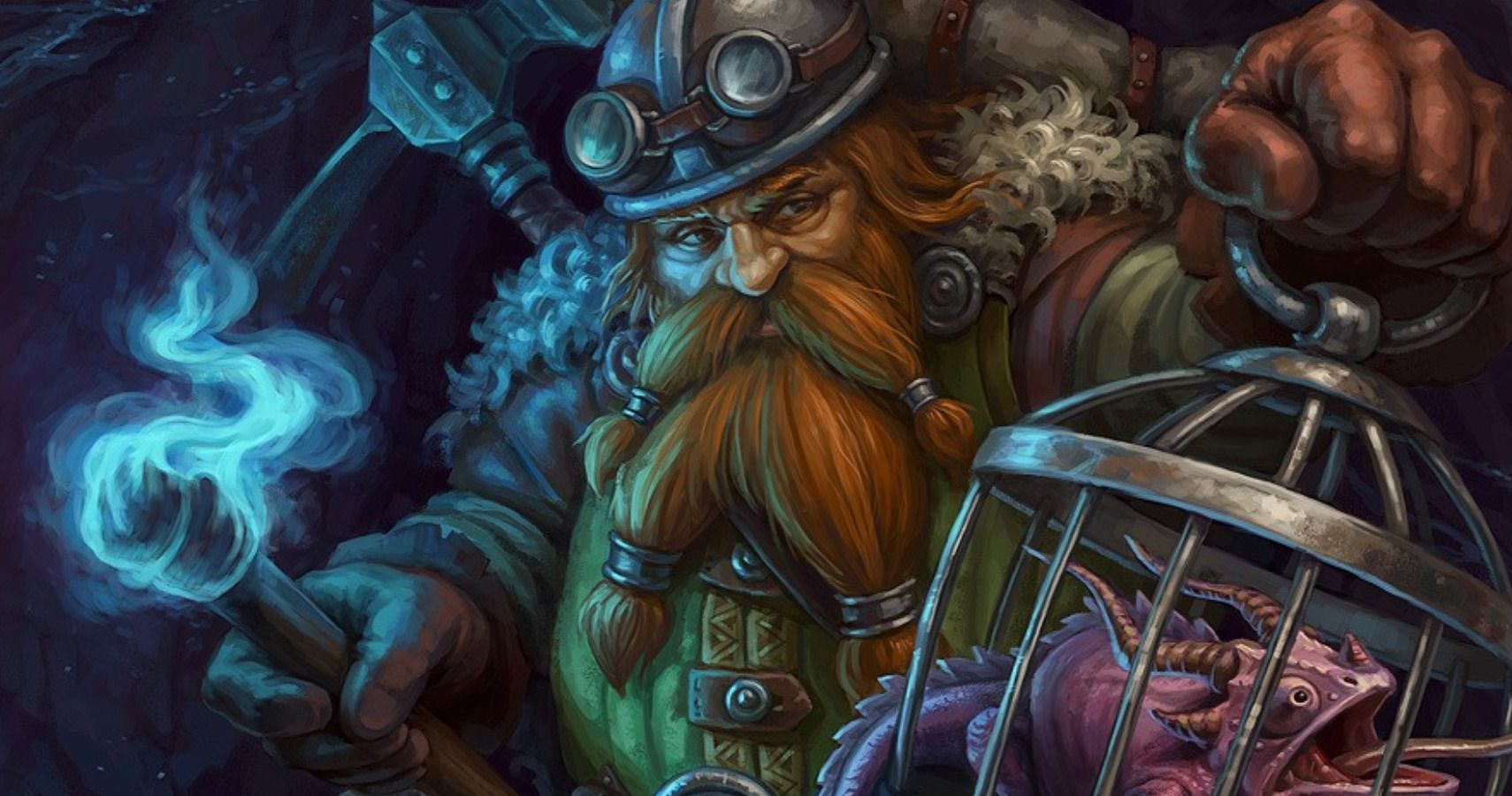Clerics were previously a class that was relegated to healing or support roles. However, in today's world of tabletop RPGs, the Cleric is a versatile character that can fill almost any role depending on the build. In the same way that a Rogue can be a combat-hungry slicer and dicer, or a silver-tongued master of disguise, a Cleric can also play entirely distinct roles within a Dungeons & Dragons party.
Feats are a part of your initial character build and are taken in place of an ability score increase once your character reaches specific levels in their class. They offer variety and diversity that can entirely shift how a class is played. The Cleric is already diverse in that there are different gods with a wide variety of Domain options available. The result is that the Cleric can be played in some of the most creative ways in the entire game, relative to some other classes.
Updated on August 14, 2021, by Kristy Ambrose: The D&D universe continues to expand, and now more options are available to customize your Cleric. A few more Feats are available along with new choices of Domains, spells, weapons, and other accessories. The Cleric is still the game's best healer but is now recognized as a solid choice for a combination class, so depending on the Domain and Feats you choose, you can also take on some melee damage or defense roles in your party.
Cleric, Healing Role
We will begin with the Cleric that most party members expect to see, which is one focused solely on healing. Healing can be a tremendous boon to the party. At the same time, watch for players who dive headfirst into ridiculous and deadly encounters with the assumption that you will be there to pick up the pieces. As a Cleric, you are an intermediary between the mortal world and the distant planes of the gods, not a walking first-aid station to come running to the headstrong and foolish Fighter who doesn't understand tactics.
Healer
- Source: D&D Player's Handbook
- Benefits: Stabilize a creature and restore it to 1 hit point, or restore 1d6+4+the target's number of Hit Dice.
- Ideal Domains: Grave, Life
- Prerequisite: None
Healing is important, but so too is preserving spells between rests. As a physician, this feat allows you to mend wounds quickly. Using a Healer’s Kit to stabilize a dying creature restores one hit point, and as an action, you can use the healer’s kit uses to restore 1d6 + 4 hit points, plus additional hit points equal to the creature’s maximum number of hit dice. This is particularly useful when there is simply too much demand for healing that will quickly drain those prepared spells.
Inspiring Leader
- Source: D&D Player's Handbook
- Benefits: Up to six creatures within 30 feet gain temporary hit points equal to your level, plus your Charisma modifier.
- Ideal Domains: Forge, Order
- Prerequisite: Charisma score of 13 or higher.
If MMORPGs have taught us anything, it is that pre-buffing helps tremendously in an intense battle. With Inspiring Leader, a Cleric spends 10 minutes shoring up the resolve of the party for the upcoming fight.
Up to six friendly creatures, including yourself, within 30 feet who can see, hear and understand you receive temporary hit points equal to your level to the bonus of your Charisma modifier. What’s better than healing wounds? Giving your teammates imaginary hit points that you do not have to heal.
Mobile
- Source: D&D Player's Handbook
- Benefits: Speed increase of 10 feet, Dash on difficult terrain without malus, and melee damage doesn't give the enemy opportunity attacks.
- Ideal Domains: Arcana, Tempest, Light
- Prerequisite: None.
A Cleric should not come running to the whims of every charging Fighter, and while this is absolutely true, some classes are simply more adept at moving and may soon be just out of our reach. For example, level 5 Barbarians have Unarmored movement, granting them +10 feet, and Monks at level 15 gain the same but with +25 feet.
The Mobile feat will allow for you to keep up and get within the necessary range to target an ally, and if you are set on being the party healer, you do need to be able to reach everyone. These three feats will surely assist in making your Cleric the best healer or spellcaster they can be.
The Combat Cleric
These Clerics may have little interest in healing at all, although they will always retain some healing abilities. They are far more interested in charging into the front line to start causing damage. If an ally who needs healing happens to be around and there is no monster to attack, some incidental healing may occur. Unlike the Feats listed above for a healing-centric Cleric, these feats will both keep us alive and make us more effective.
Heavy Armor Master
- Source: D&D Player's Handbook
- Benefits: Increases Strength by one to a maximum of 20. Heavy armor reduces any bludgeoning, slashing, and piercing damage from non-magical weapons by three.
- Ideal Domain: War
- Prerequisite: Proficiency with heavy armor.
All Clerics have access to medium armor, shields, and weapons, but clerics of the War Domain have proficiency with heavy armor and military weapons. Heavy Armor Master is an absolute necessity if one plans to be a front-line Cleric. The feat will increase your Strength by 1, to a maximum of 20, and when wearing heavy armor, bludgeoning, slashing, and piercing damage you take from non-magical weapons is reduced by 3. This should assist tremendously in avoiding all but the most serious of attacks made against you, especially when facing hordes of smaller, weaker creatures.
Shield Master
- Source: D&D Player's Handbook
- Benefits: Add the AC bonus of your shield to any Dexterity saving throw against a spell or other harmful effect that targets only you.
- Ideal Domain: War, Order, Peace
- Prerequisite: None.
This Feat provides your Cleric with additional protection on the front line, specifically in that as long as you are not incapacitated you can add the AC bonus of your shield to any Dexterity saving throw against a spell or another harmful effect that targets only you. Since you are a Cleric, Dexterity is not a primary ability and your score is likely going to be low, so this becomes a necessity to stay alive at the later levels. The ability to shove an opponent away is also useful in certain situations.
Warcaster
- Source: D&D Player's Handbook
- Benefits: Advantage on saving throws to maintain concentration, the ability to cast some spells as part of an Opportunity Attack with a reaction.
- Ideal Domain: Tempest, Life, War
- Prerequisite: The ability to cast at least one spell.
Wizards are not the only class that can benefit from this Feat, which grants Advantage for constitution saving throws when making a concentration check caused by damage. More importantly, if your hands are full of weapons and shields, movement is not required to cast a spell. Given that the style of a battle Cleric is often to be on the front line with their shield and melee weapon, this is an absolute must.
This brings us to the best spells on the front line. Without a doubt, Inflict Wounds is a great choice here. Despite how great your desire to be a front-line warrior, the damage from a one-handed weapon will be lower than that of a barbarian or a fighter, but with Inflict Wounds you can do a good amount of sudden burst to a single target.
Resilient
- Source: D&D Player's Handbook
- Benefits: Plus one bonus in one ability, proficiency in saving throws while using this ability.
- Ideal Domain: War, Arcana, Light
- Prerequisite: None
This will have the dual benefit of upping your Constitution, which is useful on the front lines for incoming damage. It also assists with concentration saving throws if and when you may be channeling a spell. That's why most spellcasters take this Feat since it aids in casting spells during combat. For a healer, that could mean the difference between casting a healing spell now or a resurrection spell later.
Other Cleric Builds
There are numerous other types of Clerics that one can play, we have simply covered two that may be considered opposites in terms of game and story objective. With that said, one could consider a Cleric that leans hard into their deity, or who seeks to explore the world with the goal of acquiring knowledge.
Keen Mind
- Source: D&D Player's Handbook
- Benefits: Plus one to Intelligence, always aware of which way is North, when is the next sunrise or sunset, and the ability to recall any events within the past month.
- Ideal Domain: Arcana, Knowledge, Nature
- Prerequisite: None
It's handy to have someone in the party who is essentially a walking Farmer's Almanac. This Feat makes a lot of sense for a Cleric anyway, since they tend to be one of the studious classes, but this is especially effective when combined with a Domain that is dedicated to certain schools of thought. The Domains of Arcana and Knowledge are about collecting this kind of lore or knowing where to find it, while Clerics of the Nature Domain can use this Feat to complement their general outdoor knowledge.
Linguist
- Source: D&D Player's Handbook
- Benefits: Plus one in Intelligence, fluency in three languages, and the ability to create ciphers.
- Ideal Domain: Knowledge, Arcana, Peace
- Prerequisite: None.
Clerics who take more of a leadership or diplomatic role in their party should prioritize this Feat, especially if no other character has it. Often the Bard or Paladin will have Linguist covered, but perhaps your party composition is different, or your choice of Domain makes this important or even essential. Clerics who have taken the Peace Domain, for example, will want to broaden their verbal communication options as much as possible.
Observant
- Source: D&D Player's Handbook
- Benefits: Plus-one to Intelligence or Wisdom, the ability to read lips, and a plus-five bonus to passive Perception and passive Investigation.
- Ideal Domain: Nature, Order, Light
- Prerequisite: None.
The bonus to Intelligence is handy for a Cleric, who might have a lower score in that ability and needs a boost. On the other hand, you can choose to boost your already healthy Wisdom score to get a better saving throw. These are the types of abilities that a Bard or Rogue usually has, but in their absence, a clever, resourceful Cleric can take over if they have this Feat.




